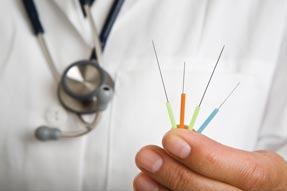Web-based therapy may help interns with suicidal ideation
Resident physicians are at high risk for depression, and training can make the situation much worse. In an effort to prevent suicidal ideation among interns, researchers tested a Web-based cognitive behavioral therapy (CBT) intervention.
Where: Teaching hospitals at Yale University in New Haven, Conn., and the University of Southern California (USC) in Los Angeles.
The issue: Preventing suicidal ideation among medical interns.
Background
Resident physicians are at high risk for depression. From 1963 to 2015, the overall prevalence of depression or depressive symptoms among residents was about 29%, according to a meta-analysis published in the Dec. 8, 2015, Journal of the American Medical Association.
Many potential factors come together to increase risk, including that many trainees have a history of depression and are therefore more prone to experiencing these symptoms, according to Constance Guille, MD, MS, assistant professor at the Medical University of South Carolina (MUSC) in Charleston and a coauthor of the study.
But training can make the situation much worse. One of Dr. Guille's prior studies, published in 2010 by Archives of General Psychiatry, showed a dramatic increase in depressive symptoms among physician trainees during their internship years. “I think that it's the interaction between having some kind of predisposing traits and then also a really intense, stressful experience of internship year,” she said.
In an effort to prevent suicidal ideation among interns, Dr. Guille tested a Web-based cognitive behavioral therapy (CBT) intervention. Encouraging results were published in November 2015 by JAMA Psychiatry.
How it works
The Web-based CBT program used in the study, MoodGYM, was developed by staff at the National Institute for Mental Health Research at the Australian National University. “Those online cognitive behavioral therapy interventions have been tested in populations that are currently symptomatic ... and they've shown that you can reduce suicidal ideation with those interventions,” Dr. Guille said. “I think what's novel about ours is that we've shown that we can actually prevent suicidal ideation, so we're not waiting for people to develop problems; we're intervening so that we don't have problems down the road.”
MoodGYM is free and open to the public. “That's exactly why we chose it. Anybody that has Internet access can use this, thus increasing chances of it being disseminated and implemented,” Dr. Guille said.
In her study, medical interns in the intervention group underwent 4 weekly MoodGYM sessions that lasted about 30 minutes each, whereas those in the control group received 4 weekly e-mails with general information about depression and how to get help. To assess suicidal ideation, researchers had the trainees complete the Patient Health Questionnaire-9 (PHQ-9) prior to the start of their internship year and at 3-month intervals throughout the year.
Results
The study included 199 interns from Yale and USC. Over the course of the internship year, at least 1 instance of suicidal ideation was reported by only 12% of interns in the intervention group versus 21.2% of those in the control group.
After researchers adjusted for factors that have been shown to increase suicidal ideation risk (sex, pre-internship PHQ-9 scores, history of depression, neuroticism, and early family environment), interns in the intervention group were 60% less likely than control participants to report suicidal ideation during their internship year. The risk reduction translated into a number needed to treat of 11. “We were hoping we would see some effect, but we were really excited about how big the effect was,” Dr. Guille said.
She said a surprising aspect of the study was how willing interns were to participate: 62.2% of those approached by researchers agreed to take part, potentially showing that prevention programs pose less stigma than treatment programs.
Challenges
Despite the known increase in suicidal ideation and other mental health issues during the internship year, prior research has shown that very few affected trainees seek treatment. In Dr. Guille's previous research, interns pointed to lack of time, access, and confidentiality. Some also feared that reporting mental health treatment would affect their state medical licensure, she said. “I think that people have concerns that if others knew that they had depression or mental health problems, they wouldn't think as highly of them,” she said.
The Web-based preventive intervention tackled not only access and confidentiality issues but also the complaint of time constraints. “We moved the intervention to before people actually started internship year, when they have more time. ... If we are seeing every year that we are having these really high rates of suicidal ideation and [mental health] problems, then we should try to prevent them as opposed to wait for when people actually had them,” she said.
Next steps
Although her results have been met with enthusiasm and excitement, Dr. Guille said she and her colleagues are trying to replicate their findings before encouraging implementation. At MUSC, she tested the intervention on about 1,000 graduate students—including medical, pharmacy, nursing, and dental students, as well as students enrolled in the health professions and graduate studies programs. “So we're looking at those data right now,” Dr. Guille said. “If it turns out that it's favorable, then we'll more than likely approach our administration to implement at the MUSC.”



